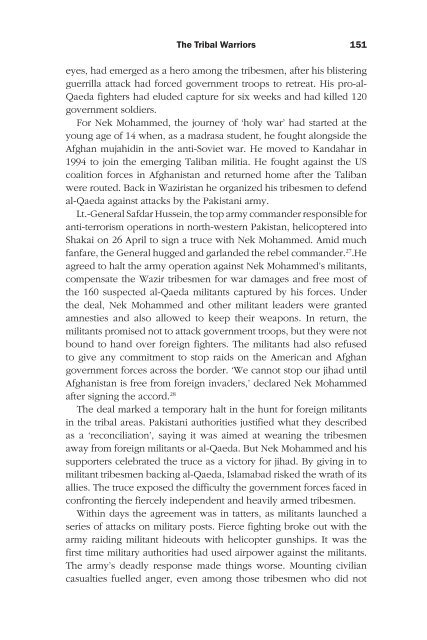Frontline Pakistan : The Struggle With Militant Islam - Arz-e-Pak
Frontline Pakistan : The Struggle With Militant Islam - Arz-e-Pak
Frontline Pakistan : The Struggle With Militant Islam - Arz-e-Pak
You also want an ePaper? Increase the reach of your titles
YUMPU automatically turns print PDFs into web optimized ePapers that Google loves.
<strong>The</strong> Tribal Warriors<br />
1 1<br />
eyes, had emerged as a hero among the tribesmen, after his blistering<br />
guerrilla attack had forced government troops to retreat. His pro-al-<br />
Qaeda fighters had eluded capture for six weeks and had killed 120<br />
government soldiers.<br />
For Nek Mohammed, the journey of ‘holy war’ had started at the<br />
young age of 14 when, as a madrasa student, he fought alongside the<br />
Afghan mujahidin in the anti-Soviet war. He moved to Kandahar in<br />
1994 to join the emerging Taliban militia. He fought against the US<br />
coalition forces in Afghanistan and returned home after the Taliban<br />
were routed. Back in Waziristan he organized his tribesmen to defend<br />
al-Qaeda against attacks by the <strong><strong>Pak</strong>istan</strong>i army.<br />
Lt.-General Safdar Hussein, the top army commander responsible for<br />
anti-terrorism operations in north-western <strong><strong>Pak</strong>istan</strong>, helicoptered into<br />
Shakai on 26 April to sign a truce with Nek Mohammed. Amid much<br />
fanfare, the General hugged and garlanded the rebel commander. 27 .He<br />
agreed to halt the army operation against Nek Mohammed’s militants,<br />
compensate the Wazir tribesmen for war damages and free most of<br />
the 160 suspected al-Qaeda militants captured by his forces. Under<br />
the deal, Nek Mohammed and other militant leaders were granted<br />
amnesties and also allowed to keep their weapons. In return, the<br />
militants promised not to attack government troops, but they were not<br />
bound to hand over foreign fighters. <strong>The</strong> militants had also refused<br />
to give any commitment to stop raids on the American and Afghan<br />
government forces across the border. ‘We cannot stop our jihad until<br />
Afghanistan is free from foreign invaders,’ declared Nek Mohammed<br />
after signing the accord. 28<br />
<strong>The</strong> deal marked a temporary halt in the hunt for foreign militants<br />
in the tribal areas. <strong><strong>Pak</strong>istan</strong>i authorities justified what they described<br />
as a ‘reconciliation’, saying it was aimed at weaning the tribesmen<br />
away from foreign militants or al-Qaeda. But Nek Mohammed and his<br />
supporters celebrated the truce as a victory for jihad. By giving in to<br />
militant tribesmen backing al-Qaeda, <strong>Islam</strong>abad risked the wrath of its<br />
allies. <strong>The</strong> truce exposed the difficulty the government forces faced in<br />
confronting the fiercely independent and heavily armed tribesmen.<br />
<strong>With</strong>in days the agreement was in tatters, as militants launched a<br />
series of attacks on military posts. Fierce fighting broke out with the<br />
army raiding militant hideouts with helicopter gunships. It was the<br />
first time military authorities had used airpower against the militants.<br />
<strong>The</strong> army’s deadly response made things worse. Mounting civilian<br />
casualties fuelled anger, even among those tribesmen who did not













